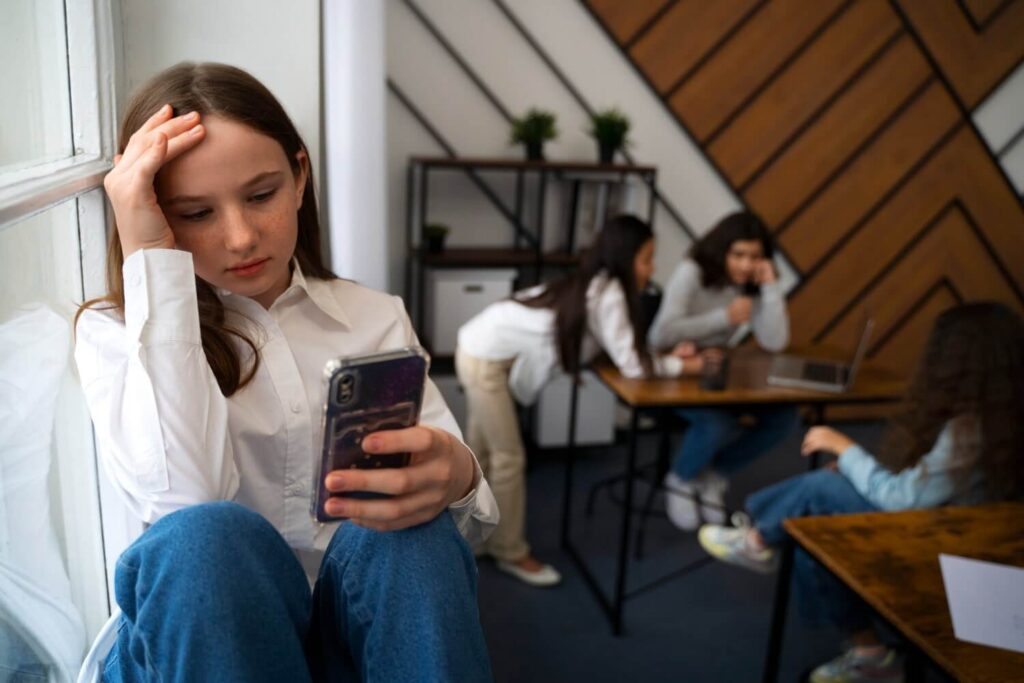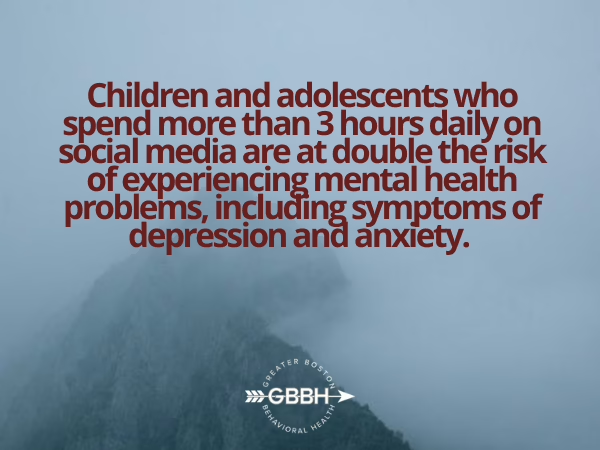Social media. It’s woven itself into the fabric of our daily lives. We scroll through timelines catching up with friends, get our news fix, and maybe even learn a new dance move or two (courtesy of TikTok). But this constant connection comes at a cost. Studies have emerged suggesting a potential link between social media use and mental health concerns, particularly among young adults.
The Evolution of Social Media
Before we dive into the nitty-gritty of social media’s impact, let’s take a quick trip down memory lane. Remember those clunky dial-up connections and pixelated chat room avatars? Social media has come a long way since its humble beginnings in online forums and chat rooms. The rise of social media giants like Facebook and Twitter brought a new era of connection, allowing us to stay in touch with loved ones across vast distances and fostering online communities with shared interests.
Then came the smartphone revolution. Social media became a constant companion, fitting snugly in our pockets and offering a never-ending stream of updates and notifications. Today’s social media landscape is a complex ecosystem dominated by a handful of major platforms, each with its own unique features and algorithms vying for our attention.
Understanding this evolution is crucial. The way we use social media today is fundamentally different from how we used it a decade ago.
The Fear of Missing Out (FOMO): When Everyone Else’s Life Seems Perfect
We’ve all been there. Scrolling through social media, bombarded with pictures of friends vacationing in exotic locales, colleagues celebrating work promotions, and seemingly perfect couples posting loved-up selfies. Suddenly, a familiar feeling creeps in – the fear of missing out, or FOMO.
But what exactly is FOMO, and how does it affect our mental health?
FOMO is a social comparison phenomenon fueled by the carefully curated feeds of social media. We see the highlight reels of others’ lives – the vacations, accomplishments, and happy moments – and it’s easy to feel like our own lives pale in comparison. This constant barrage can trigger feelings of inadequacy, anxiety, and even depression.
The Psychology Behind FOMO
Our brains are wired for social connection. Evolutionarily, feeling like we belong to a group is essential for survival. Social media taps into this basic human need, but in a way that can be distorted. We see others seemingly living their best lives and fear that we’re missing out on something exciting or fulfilling.
Furthermore, social media algorithms play a role. Platforms personalize feeds to keep us engaged, often showcasing content that triggers emotional responses, including envy and FOMO. The constant stream of “perfect” lives can distort our perception of reality, making us feel like everyone else is happier and more successful.
So, how do we combat FOMO and protect our mental well-being in the age of social media? Here are a few tips:
- Be Mindful of Your Social Media Consumption: Take breaks! Schedule specific times to check social media and stick to them. Consider deleting social media apps from your phone to reduce temptation.
- Practice Gratitude: Shift your focus to the positive aspects of your own life. Keep a gratitude journal and write down things you’re thankful for each day.
- Focus on Real-Life Connections: Nurture your relationships with friends and family in person. Invest in quality time with loved ones who make you feel supported and appreciated.
- Curate Your Feed: Unfollow accounts that make you feel inadequate or unhappy. Follow people who inspire you and promote positive vibes.
- Remember, Social Media Isn’t Real Life: Those perfectly staged photos and envy-inducing posts only show a tiny fragment of someone’s life. Don’t compare your behind-the-scenes reality to someone else’s highlight reel.
By taking control of your social media habits and practicing self-compassion, you can overcome FOMO and cultivate a healthier relationship with technology.
Negative Impacts of Social Media
We’ve unpacked the fear of missing out (FOMO) and its grip on our mental well-being. But FOMO is just one piece of the puzzle. Social media can have a darker side, impacting our mental health in a multitude of ways. Let’s delve deeper into some of these negative consequences.
Unrealistic Beauty Standards
Social media is saturated with heavily edited photos and portrayals of “perfect” bodies. This constant bombardment can lead to body image dissatisfaction, particularly among teenagers and young adults. The pressure to conform to unrealistic beauty standards can fuel low self-esteem, eating disorders, and even depression.
Social Comparison and Isolation
Scrolling through endless feeds of seemingly perfect vacations and social gatherings can exacerbate feelings of loneliness and isolation. Social media fosters social comparison, leading us to compare our own lives to the carefully curated experiences of others. This can create a sense of disconnection and a yearning for a life we may perceive as better. Ironically, excessive social media use can leave us feeling more isolated despite being constantly connected.
Sleep Deprivation
The blue light emitted from electronic devices disrupts our sleep patterns. Late-night social media binges can make it harder to fall asleep and stay asleep, leading to fatigue, difficulty concentrating, and irritability. Chronic sleep deprivation can further worsen symptoms of anxiety and depression.
Cyberbullying
The anonymity of the online world can embolden some to engage in cyberbullying. This can take many forms, from hurtful comments and name-calling to social exclusion and online harassment. Cyberbullying can have devastating consequences for mental health, leading to depression, anxiety, and even suicidal ideation.
Building a Safe Space: Strategies for a Healthy Digital Life
Social media doesn’t have to be a detriment to your mental well-being. Here are some tips to navigate the online world safely and build a healthy digital life:
- Be Selective About Who You Follow: Surround yourself with positive influences. Follow accounts that inspire you, uplift you, and promote genuine connection. Don’t hesitate to unfollow or mute accounts that make you feel bad about yourself.
- Manage Your Privacy Settings: Take control of your online privacy. Explore the privacy settings offered by each platform and adjust them to your comfort level. Limit who can see your posts and information.
- Take Breaks and Disconnect: Schedule regular breaks from social media throughout the day. Turn off notifications and consider setting time limits for how long you allow yourself to be on each platform.
- Focus on Real-Life Connections: Social media can’t replace genuine human connection. Nurture your relationships with friends and family in person. Invest in quality time with loved ones and engage in activities that bring you joy.
How Social Media Can Actually Benefit Your Mental Health
Social media has gotten a bad rap when it comes to mental health. But before you hit delete on all your accounts, consider this: social media can also have some surprising upsides. Let’s explore the positive ways social media can contribute to your well-being.
Building Communities and Finding Support
Social media platforms can connect you with people who share your interests, hobbies, or experiences. Whether you’re passionate about birdwatching or navigating the challenges of a chronic illness, online communities offer a sense of belonging and support. Sharing your experiences and connecting with others who understand can be incredibly validating and help combat feelings of isolation.
A Platform for Self-Expression
Social media allows you to express yourself creatively, share your ideas, and connect with a wider audience. Platforms like YouTube can be a launchpad for budding artists and musicians, while blogs and Instagram can provide a space to share your passions and stories. This self-expression can be empowering and boost your self-esteem.
Mental Health Awareness and Advocacy
Social media can be a powerful tool for raising awareness about mental health issues. Platforms like Twitter and Instagram have been instrumental in sparking conversations about anxiety, depression, and other mental health challenges. Following mental health professionals and organizations can provide you with valuable resources and information.
Spreading Positivity and Inspiration
Social media isn’t all negativity. There’s a wealth of positive and uplifting content online. Follow accounts that inspire you, make you laugh, or promote mindfulness and self-care. Surrounding yourself with positivity can contribute to a more optimistic outlook and overall well-being.
Finding Balance – It’s All About You
Social media is a tool, and like any tool, it can be used for good or bad. The key is to find a balance that works for you. Be mindful of how social media makes you feel, and adjust your habits accordingly.
If you find yourself spending excessive time on social media, feeling anxious or depressed after scrolling, or comparing yourself to others, it’s time to take a step back. Utilize the tips mentioned above to create a healthier digital life.
Remember, you are in control. Social media shouldn’t control your happiness or well-being. Utilize its positive aspects while minimizing the negative.
Greater Boston Behavioral Health is Here to Help
Greater Boston Behavioral Health is a reputed mental health treatment center in Massachusetts. Our team of qualified professionals offers a variety of mental health programs and therapy options to help you build resilience and navigate the digital world with confidence.
If you’re struggling with the negative impacts of social media or any mental health challenges, you don’t have to go through it alone.
If you’re ready to take the first step towards a healthier and happier you, Greater Boston Behavioral Health is here to support you. We offer a variety of mental health programs and therapy options tailored to meet your individual needs.
Our team of experienced professionals can help you:
- Develop a personalized treatment plan
- Learn coping mechanisms for managing mental health challenges
- Build resilience and self-esteem
- Navigate the digital world with greater confidence
Call us today at (888)278-0716 or fill out our online contact form to learn more about how we can help you achieve a healthier and happier life.
FAQ on Social Media and Mental Health
Is social media bad for my mental health?
Social media can have both positive and negative impacts on mental health. It depends on how you use it. This blog series explores both sides of the coin.
How much time should I spend on social media each day?
There’s no one-size-fits-all answer. However, experts recommend being mindful of your social media use and setting time limits to avoid excessive consumption.
How can I use social media for good?
Social media can be a platform for self-expression, raising awareness about mental health issues, and spreading positivity. Follow accounts that inspire you and promote well-being.
What services do GBBH offer?
We offer a variety of mental health therapy programs tailored to individual needs. We can help you develop coping mechanisms, build resilience, and navigate the digital world with confidence.


